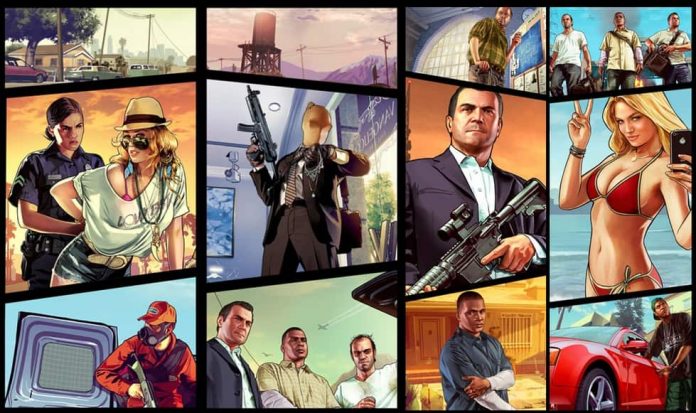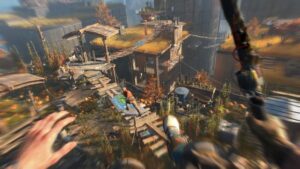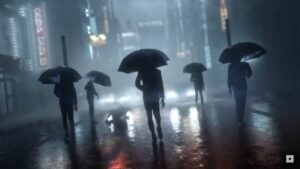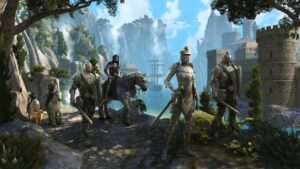
In a podcast interview, former creative director of Rockstar Games, Dan Houser, has shared some insights into how literature has helped shaped the Grand Theft Auto games over the years.
The podcast in question is Bookish With Sonya Walger, a series where host Sonya talks to interesting people about the five books that have most shaped who they are. You’ll likely recognise Sonya from her career as an actress; amongst other roles, she played Penny in Lost and Sally Harper in British sitcom Coupling Previous.
But she’s recently turned her attention to the world of podcasts, with Bookish now in its third season. Previous guests include Damon Lindelof, Chris Weitz, and William H. Macy, and Dan Houser’s appearance marks the latest episode.
Advertisement
Along with discussing the five books that shaped him, Houser goes into some detail about how literature – and specific literary titles – have influenced (sometimes directly) the GTA series. From name-dropping characters from some of his favourite pieces of literature to borrowing concepts and ideas, it seems books have had more influence on Grand Theft Auto than you might think.
The podcast makes for an interesting and worthwhile listen, and gives a unique insight into Dan Houser’s mind as a creator. It’s available now on Apple or Spotify. There’s an excerpt below, but do go and listen to the whole thing.
Sonya: How do these books – and this one in particular – where do you see their impact in the games and the stories that you have created and written? Where is the overlap? I would think people would be fascinated to… know just how literate you are. I mean it was one of the reasons – other than you being my dearest friend – I wanted to have you on the podcast. I’m curious where you see literature as having informed these creations of yours.
Dan: Everything in me partially comes from books. Partially it’s life, partially it’s movies and fifty, forty, thirty percent – whatever it is – is books. Those games that I was involved in making were big and expansive and where you would spend a lot of time with some of the characters. So a two hour movie doesn’t do that. It might show you how to set up a scene. It might influence how you deal with certain bits of sort of plot structure, but it doesn’t show you how to create a 360 degree character… And I think that a writer like James Jones, in particular, is a sort of education in doing that, because you see these characters – all sides of their personality, all sides of their self perception in all situations, in incredibly banality and absolute terror and all points in between. Then for things that are a bit more… that are still kind of action driven but a bit more comic-like there’s Raymond Chandler.
…and then lots of characters where they were background characters and I just named them after people I liked in books.
Sonya: Who?
Dan: From Light Years [novel by James Salter], I was always obsessed by this minor kind of “bon vivant” character who seems to know how to live in the world. Because in that book I always related to it because nobody knows how to live. They’re all lost and in this miasma of their own making and then there’s this one guy in it who’s this medium level character called Arnaud and he’s totally content with himself and I’m always jealous of those people. I’m like “how do you exist? I don’t know how to.”
And so I had in the background of either Grand Theft Auto 4 or it might have been one of the add-on packs… but he was this French kind of modern-day version of a flâneur who just knew how to exist, so I called him Arnaud in honour of him. Little things like that, that are just sort of throw-away.
But most of it is… bigger – particularly in writers like James Jones, like Middlemarch [by George Elliot], like Dickens, whom I’ve always loved, like Vanity Fair, when people are writing about all of society, when people are showing viewpoints from multiple kinds of characters. And the point of that kind of fiction is it’s not the exteriors – “I’m a man. I’m a woman. I’m this race. I’m this class” – but what’s inside. That’s the point of fiction. It’s to show the dividing lines shouldn’t be the material, superficial. It should be “are you an arsehole or not?” That’s how we should value people. Are you trying to be a better person or not? And that’s what I get out of that kind of fiction and what I try to let sort of bleed in in certain places. Where’s the line of your behaviour and when you’re faced with choices what is your own ethical framework and how much are you willing to break it? That sort of one of the purposes of realist fiction of that kind or sort of material fiction I call it. Where are you are dealing with sort of external factors or… and that’s the point of it. It’s to sort of let you see it from other perspectives.
Sonya: That’s fascinating. I think that’s what is so interesting to me about fiction and the very obvious distinction between fiction and the worlds you created. In fiction you have no choice, right? You are given the palette you’re given and you’re given the frame. And you can choose to lean into, relate to, empathise with the characters over others but the drawing is prescribed. It is what it is. Your worlds, as you say, confront you with these moral choices and your ethics and imperatives are being challenged at every given turn. It’s interesting to see the mapping of one onto the other, orn to hear you talk about that.
Dan: Yeah, I think in those games on the story side you had lots of freedom over choices but fundamentally the story funnelled you in a certain way. So, it’s trying to… making sure those two didn’t clash too much and trying to make it feel like ‘I’m a nicer version of this character’ versus ‘they are a nastier version of this character’. It funnels… there will be flexibility in quite how it’s funnelled. But I also think is to some extent real in terms of our lives we are still governed by forces outside of our control. We are not absolute agents of anarchy at any moment. You are still pushed and propelled by everyone else in the world as well.
- Absolute
- Action
- Add-on
- agents
- All
- auto
- Bit
- Books
- Borrowing
- British
- call
- Career
- content
- Creative
- creator
- deal
- dealing
- detail
- Director
- driven
- Education
- ethics
- fair
- fascinating
- Fiction
- Flexibility
- Framework
- Freedom
- Games
- George
- Grand Theft Auto
- How
- How To
- HTTPS
- i
- Impact
- influence
- insights
- Interview
- involved
- IT
- latest
- Level
- Line
- literature
- Making
- man
- medium
- movie
- Movies
- Other
- People
- Personality
- perspectives
- podcast
- Podcasts
- Race
- reasons
- RELATED
- Rockstar
- Series
- set
- shared
- Shares
- So
- Society
- spend
- Stories
- Talks
- The
- the world
- theft
- time
- unique
- value
- Versus
- What
- What is
- WHO
- woman
- world
- writer
- writing
- years











